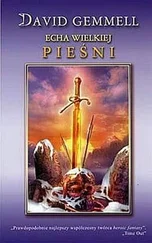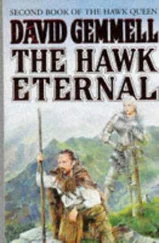'No,' said Vorna gently. 'It is moving east.'
'The Falls are beautiful,' said Meria, wiping away her tears. 'Ruathain and I used to swim there. I remember the first day Conn leapt from the high rock into the pool. He was only five.' She bit her lip, and turned her face away. 'It does not seem so long ago, Vorna. I look at the house sometimes and I expect little Bran to come scampering into the yard, and to see Connavar and Wing playing on the hillside.' She fell silent, her eyes turning to the marching army. Then she sighed. 'Now Bran is a general, Wing is a traitor, and my Conn…'
Head bowed, tears streaming, Meria walked away across the meadow.
Banouin's spirit floated high in the sky above the Rigante army, while his body lay in a small wood to the north, Brother Solstice sitting beside it. To the casual onlooker the young druid would appear to be sleeping. Instead he was tasting the freedom that only the mystic could ever know; no yearning from the flesh, no hunger, no passion, no anger. To soar free of the body was unlike any other experience in Banouin's life, and he could not describe the exquisite joy of it. It was, he once told Connavar, like seeing the sun dawn following a night of fear and trembling. But this was a pale and inadequate description. It was said that in the far north the sun shone for six months without cease, and then night would fall and darkness remain throughout autumn and winter. Perhaps, thought Banouin, the people who dwelt there would understand better the analogy.
He gazed down at the army. They were travelling in four columns, and it seemed to Banouin, from this great height, that the columns resembled immense serpents, slithering over the hills. Furthest south was Connavar and his ten thousand Iron Wolves. Sunlight glittered on their mail shirts and helms, giving the snake the appearance of scales. Behind, and a half mile to the west, came the Horse Archers, followed by heavily armoured infantry. A long way back were the baggage and supply wagons, hundreds of them, drawn by oxen.
Banouin flew to the south, covering more than twenty miles in a few heartbeats.
The soldiers of Stone were building their nightly fortress, a massive undertaking involving the creation of ramparts ten feet tall, set in a great square with sides close to half a mile in length. This daily feat of engineering was a tribute to the skills of Stone, and the cold, calculating genius of Jasaray. Every morning three Panthers, nine thousand fighting men, would leave the fortress and march a specified distance into enemy territory – usually around twelve miles. An advance guard of mounted officers would mark out the next night camp, using coloured stakes to signify the placement of the general's command tent, the officers' area, the section where the troops would pitch their own tents, and sectors for latrines, baggage wagons, and picketing for horses. Once the Panthers arrived the first and second would take up defensive positions around the site of the camp, while the third would begin to dig the enormous square trench, throwing up earth to form the walls of the fortress.
It was a colossal undertaking, and planned with great precision. Should an enemy attack the advance guard they would fall back towards the previous night's fortress. If an enemy force struck at the centre of the line, as the army moved from fortress to fortress, the Panthers would fold back and encircle them. If the rear of the line came under threat they would withdraw, in order, to the new fortress. Banouin gazed down, watching the soldiers digging. If Connavar's cavalry looked like a serpent, then from here the soldiers of Stone were termites, working tirelessly in the earth.
There was, of course, a serpent. The lines of Jasaray's marching army extended back over the full twelve miles to the previous night's camp. The last of the wagons, and the three Panthers guarding them, were yet to leave. Banouin floated closer to the marching men, flowing along the lines until he saw Jasaray. The emperor was riding a grey horse, and he was chatting to a group of officers. Sadness touched Banouin's spirit, for riding just behind Jasaray was Maro, the son of Barus, his friend from the university.
Banouin withdrew once again to a great height. Better not to see faces, he thought. Better not to think of the thousands of individuals on both sides who were moving inexorably towards pain, mutilation or death.
The young druid estimated the size of Jasaray's force, then flew back to his body. He opened his eyes. Brother Solstice was sitting quietly nearby, dozing, his back against a tree. He awoke as Banouin sat up. 'How far?' asked the older man, yawning and stretching.
'Just over twenty miles. There are twelve Panthers, but few mounted scouts.'
'Twelve? That's not good,' said Brother Solstice.
Banouin rose and walked to his horse. During the past thirty years Stone armies had defeated enemies boasting ten times their number. Their victories had been won by awesome organization, discipline, and the fact that the soldiers of Stone were not militia, drafted into battle from their farms to fight, but professional soldiers who trained daily, obeying orders instantly without question. Their close-order skills were legendary, and previous Keltoi armies had been crushed by them with ease. Jasaray himself had destroyed the Perdii across the water using only five Panthers, fifteen thousand men. And the Perdii army had mustered more than a hundred thousand warriors.
Connavar would take the field with around half that number – facing thirty-six thousand battle-hardened Stone veterans led by the greatest general of them all. Banouin shivered at the prospect.
Heeling his horse forward he rode from the wood to make his report to Connavar.
Brother Solstice was a big man. in his youth, it was said, he had been a bonny fighter, wide-shouldered and immensely powerful. Now in middle age he had added weight to the hips and belly, which made his choice of mount all the more unusual. Brother Solstice rode a fat donkey, and had to lift his legs to avoid his feet dragging on the ground. He did not mind the jokes of the men in marching columns as he rode past, but gave them a cheery wave and a smile. 'Horses', Brother Solstice was fond of saying, 'make a man proud. Druids should avoid such temptations.'
'You don't avoid ale,' Banouin had once pointed out. 'Or uisge, or fine food.'
'Ah, but then no-one is perfect,' Brother Solstice had told him.
As he rode now behind Banouin's tall horse Brother Solstice was in more sombre mood. It was not just the news of Jasaray's army, though this was enough to make most sane men sombre. Rather it was the demeanour of the two principal generals of the Rigante, Connavar the fighting king, and Bendegit Bran the strategist. Conn had always been a serious man, deep-thinking and focused. Now he seemed strangely withdrawn, as if he carried a burden he could share with no man. And Bendegit Bran, well loved by the men for his good humour and his lack of arrogance, had become moody and short-tempered. The death of his son had hit him hard. Like his father before him Bendegit Bran was a family man, and by that Brother Solstice meant a man to whom family was everything. Bran had adored his son. Brother Solstice felt for him, but there were larger issues at stake here.
One distracted general could result in a costly mistake. Two distracted generals spelt disaster – and not only in issues of strategy. Brother Solstice could feel the growing unease in the army. Many among the Keltoi had misinterpreted Bran's grief as fear of the advancing Jasaray. This, in itself, would not affect the outcome of the battle, for the army looked to Connavar for overall leadership. He was their talisman, the undefeated warrior king who had already smashed one army of Stone. This was the man who carried the magical Seidh sword, which could cut through armour. As long as he rode at the head of the army the hearts of the fighting men would be inspired.
Читать дальше












